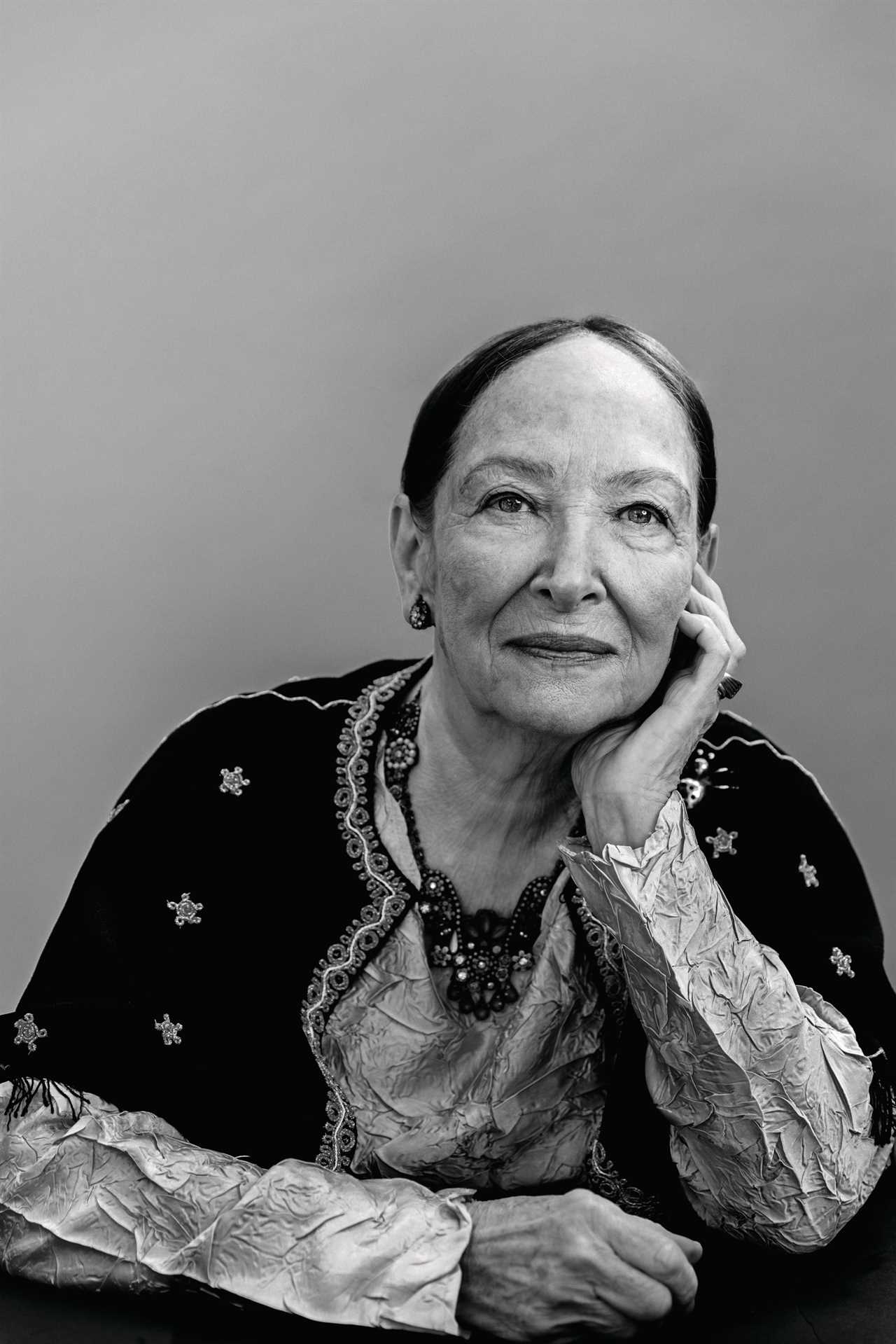
On the last Friday morning of the spring session of the Supreme Court of Canada, the chamber was nearly empty. Screens set up in view of the ermine-clad Supremes showed the faces of a bunch of lawyers, waiting on Zoom to argue a copyright case. But before the day’s scintillating main event could begin, Richard Wagner, the stern and dignified chief justice, had a few words to say.
This was the last day Rosalie Silberman Abella would be sitting while the country’s highest court was in session. She turns 75 on July 1. The court’s age limit permits no appeal. After 17 years on the court, and 45 years as a judge altogether, lives and fortunes will at last no longer hang on Rosie Abella’s opinions.
When Ontario’s attorney general Roy McMurtry appointed her to the Ontario Family Court in 1976, she was 29. The youngest judge in Canadian history. The first appointed to the bench while pregnant. She leaves the Supreme Court as its longest-serving current member, Wagner reminded the tiny live audience and however many others were watching via the internet, and as “a champion of equality rights.”
Now it was Abella’s turn to address her colleagues, the handful of spectators, and posterity. Wagner was sitting next to her, but a Plexiglas barrier separated them and, Abella said, saved Wagner from “a grateful hug.”
Abella’s speech was brief. She remembered that friends had advised her against taking that first judicial appointment. Family Court was a dead end. She had a fine law career and a young family. She could hold out for better. Yet she didn’t hesitate. “People like me—female, Jewish, immigrant, refugee—weren’t exactly being appointed to the bench in droves,” she said. Offered a position, she took it. “After all, immigrants live for opportunities, not entitlements.”
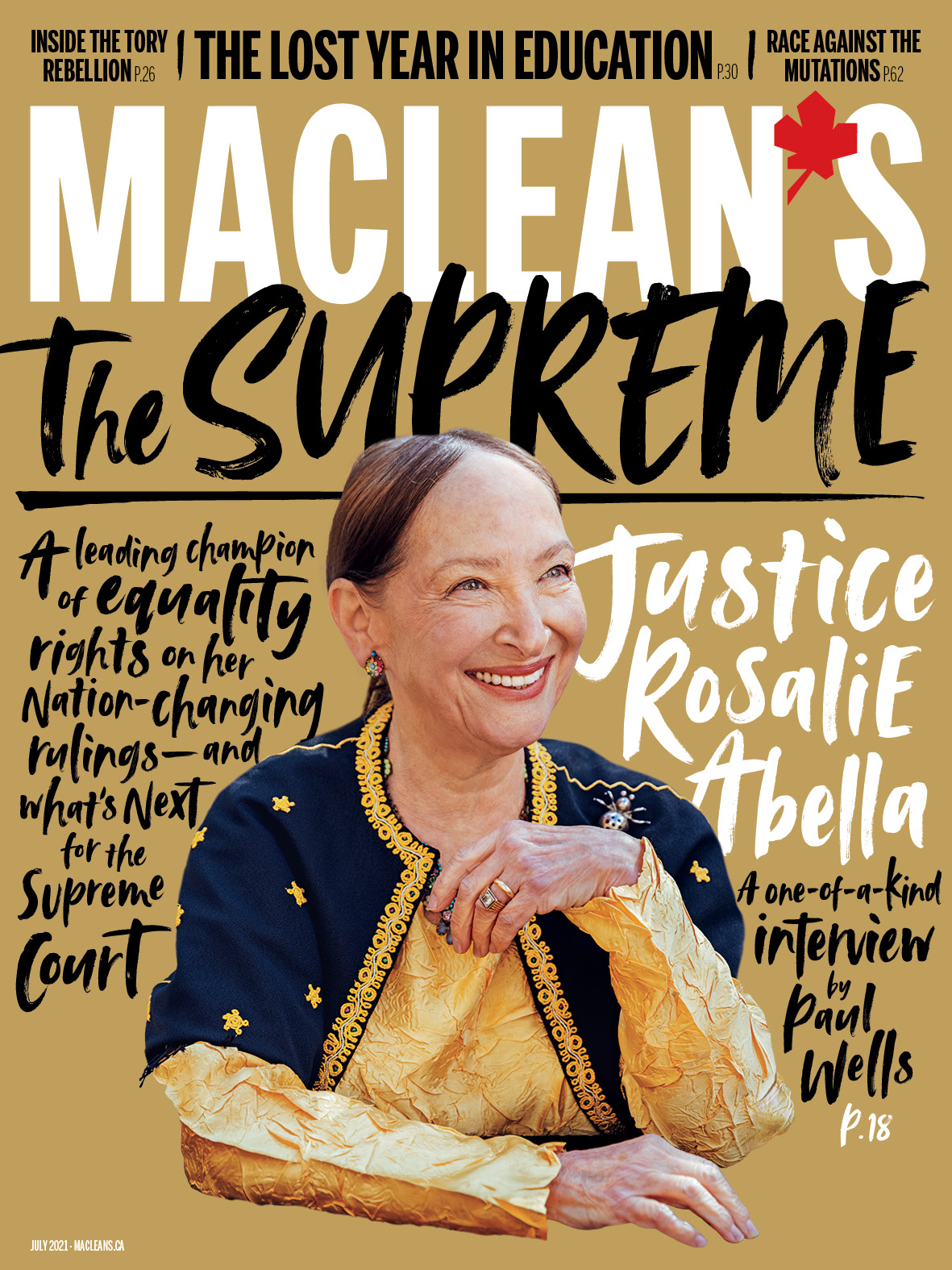
She offered a few choice aphorisms that would tend to confirm her reputation—welcome to many, maddening to others—as the court’s leading progressive activist. Justice, she said, is “the application of law to life, not just the application of laws to facts.” And “compassion is a better interpretive tool than passion,” but “passion is better than indifference.”
It was all going fine until she mentioned her family. “Our deepest debt is to the people close to us,” she said, and burst into tears.
That’s Rosie Abella, if you know her, and I might as well admit I do. “She wears her heart on her sleeve,” the University of Waterloo political scientist Emmett Macfarlane told me when I called him for advice before interviewing her. That much I already knew. I was leery when my bosses in Toronto asked me to interview the retiring, but never retiring, justice for this issue of Maclean’s, because my family has been friends with hers for a decade.
I knew nothing about her when Paul Martin appointed her in 2004, and didn’t meet her until she’d already been in Ottawa for a few years. We met for lunch, as people in the capital sometimes will, and I found myself venting to her about what for me were the new challenges of step-parenting. As an enthusiastic mom—she has two grown sons with the eminent historian Irving Abella, whom she only ever calls Itchie and whom she married at 22—she was full of advice. It was good advice. It helped.
Since then, it’s been lunch or dinner every few months. Often at a dim sum place in Ottawa’s modest Chinatown, sometimes Italian in a working-class neighbourhood further east. (The Abellas are cheerfully disdainful of vegetables.) Sometimes dinner is at the Abellas’ Ottawa condo, where the guest lists always change and the menu never does. Conversation never includes subjects before the court or cases that might conceivably find their way there. Other topics fill the vacuum, including one that is never far from Abella’s heart: Broadway musicals.
INTERACTIVE: A rare peek into Justice Rosalie Abella’s office
I don’t often write about the Supreme Court. In fact, I’ve always wished I could write more. But it is not the sort of place that rewards drive-by journalistic evaluation, and events at Parliament, a couple of blocks further east on Wellington Street, forever conspire to keep me from settling in for longer visits. So I’ve never written at any length about Abella. We were evenly matched: she says she has never given a long interview as a judge. She wanted to wait until she was done before she stopped to take a lot of questions.
We met over Zoom from opposite ends of Ottawa, in our unaccustomed roles. The topics included equality, longevity, judicial activism, and a crucial moment in the history of an institution at the summit of Canadian power. That moment can be summed up in a simple but fraught question: after Rosie Abella retires, who will take her place?
But first I had to ask Abella about that farewell speech a few days earlier. In retrospect, was she angry at herself for the tears?
“I was surprised,” she says, “because when I wrote it—like, ’til 5:30 in the morning, because it wasn’t coming, and it’s the kind of speech you can’t write until you really want to write it—when I wrote it, the hardest part was the ending. The last three minutes. It took a couple of hours to write. But I was not crying when I wrote it. So I thought, ‘Oh, good. I’m going to give a speech without crying.’ And then, as the words came out . . . I just found myself overwhelmed at the idea that I was now turning 75, that everything I had done in my adult life, professionally, the biggest chapter was wrapping up. And that I couldn’t have done it without the family.
“So it just hit me and surprised me. Was I angry at myself? I long ago gave up being mad at myself for crying. I never know when it’s gonna come. I watch commercials that make me cry. So the older I get, the more sentimental I become.”
If the rules were different, and justices didn’t have to retire at 75, would she serve for 10 more years?
“Well, let’s dissect that, because that’s a very interesting question. First question is, is it a good idea to have rules that say when a judge has a sell-by date and it’s time to move and make room for someone else and get fresh blood on the court? And I think you can tell from my answer how I feel about that. I think it’s crucial to be able to have a stage where we’re told, ‘Thank you very much. But it is really time for someone else to come in.’ ”
There are other jurisdictions, Abella says, where “there is often an inability to say, ‘This is the right time to go.’ ” Well, other jurisdictions. Why be cagey? She amends her remark: “Another jurisdiction.” The United States. John Paul Stevens, she notes, was appointed in 1975 by Gerald Ford and left, when he was 90, under Barack Obama in 2010. “Several of the judges left well past when they were comfortable doing their job. So I love our system, where we know when it’s time for us to leave. It makes a lot of sense. I don’t have the slightest regret.”
If anything, Abella thinks the mandatory retirement age could be reduced to 70. Some countries put a 12-year limit regardless of age. “I think that’s short. But I really am a huge fan of the fact that this is not a job forever.”
In his remarks at the farewell ceremony, Wagner called Abella the court’s leading champion of equality rights. Was that the mission she set for herself when Paul Martin appointed her in 2004?
“No, no, I had no mission. I had no mission on the Supreme Court except to really be a good judge.” In a way it was a continuation of her 12 years on the Ontario Court of Appeal. Both jobs are built for generalists. “You get the cases you get. You don’t say, ‘I would really like to do a constitutional case this week.’ You get the range. You get the constitutional and the criminal and the contract and the statutory interpretation and you take it all.” Besides, she thought she’d already made a contribution to equality rights as a specialist—when she ran a one-woman Royal Commission on Equality in Employment from 1983 to 1984.
“I felt my mission was not to produce something that was going to be implemented. That was a surprise. Because it was set up by Lloyd Axworthy and the Liberals [in the last days of Pierre Trudeau’s government]. And when I finished it a year later, it was Flora MacDonald and Brian Mulroney. So a different political party. But you never do a Royal Commission thinking it’s going to be implemented anyway. So I was writing a document about equality in employment that I thought would, if I did it well, be a useful study document for universities.”
EDITORIAL: Governments are increasingly turning to retired judges for help. Is that a bad thing?
The whole thing did not look particularly auspicious. Abella was not yet 37 when Axworthy appointed her, a provincial court judge running a federal Royal Commission. “My responsibility was to look into the barriers to employment for groups who represented 62 per cent of the population. I had one year and $1 million to do it.” A few months after her mandate began, a new government—John Turner’s—appointed another Royal Commission to look into the sealing industry. Video of fluffy white baby seals being clubbed was causing a global uproar. The seal commission had seven commissioners, seven times Abella’s budget, and ended up working twice as long.
Off to work then. Abella’s mandate was sweeping and, in hindsight, seems prescient. “Measures taken by Canadian employers to increase the employability and productivity of women, native people, disabled persons and visible minorities have as yet not resulted in nearly enough change,” the Abella commission’s terms of reference declared. Her job would be to promote employment opportunities and “eliminate systemic discrimination.” She travelled across the country, stopping in 17 places to hear from representatives of each of the four named groups—the aforementioned women, Indigenous Canadians, disabled persons and racialized Canadians—as well as from employers and union representatives.
She dictated the first draft of her commission report. “It was 1,000 pages of garbage.” So she wrote a second draft the way she still writes: by hand, with a pen. “Three hundred pages in three months. But the first month was spent trying to figure out what equality means.”
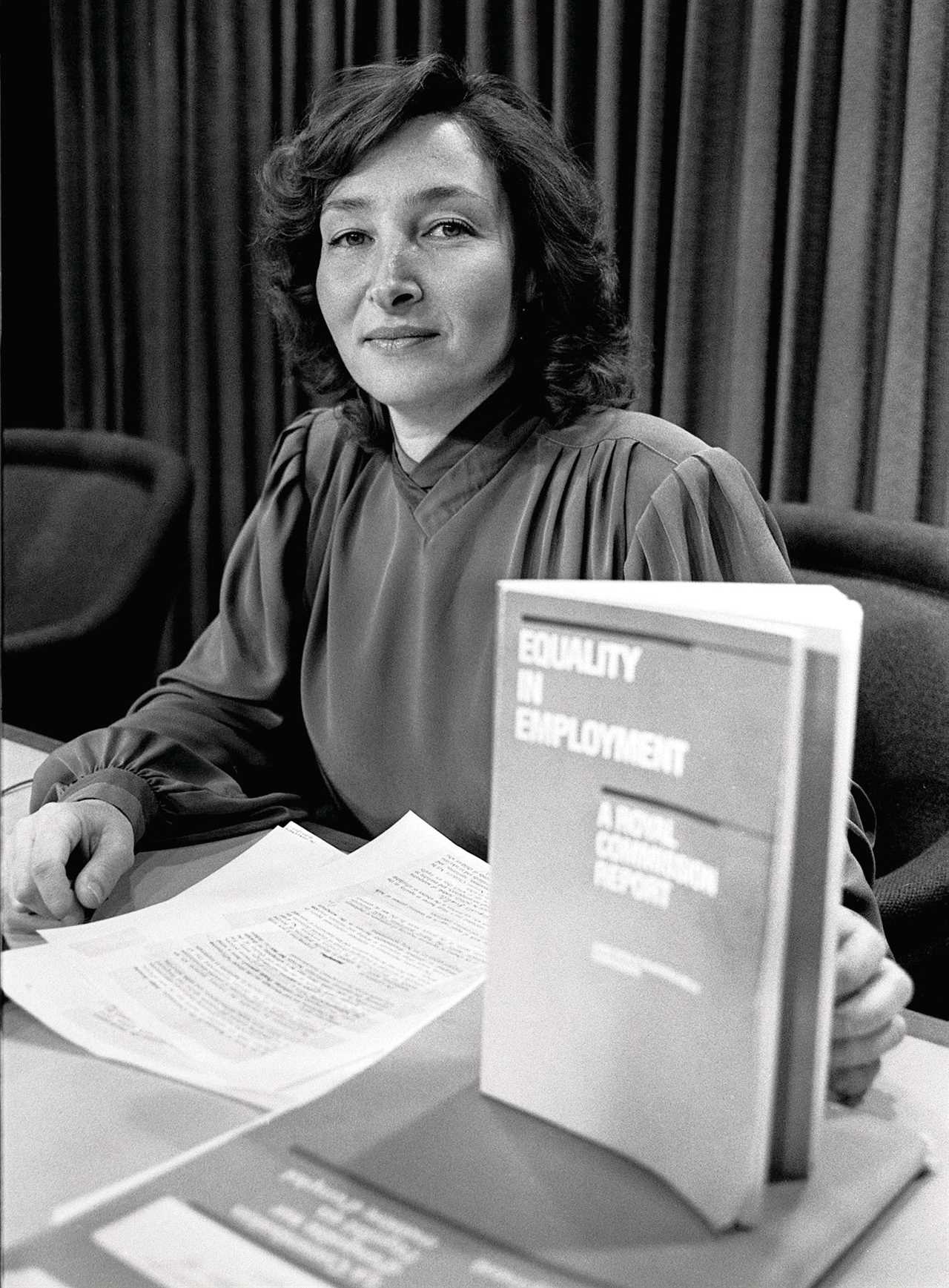
Abella delivering her report on equality in employment in 1984 (CP)
What Abella knew was that she didn’t much like examples from American jurisprudence. “It was based on the individual. No concept of membership in groups as defining identity, as defining equality.” The more she thought about it, the more Abella decided that one concept of equality—simply treating everyone the same—constituted a dead-end path. “I thought, equality, to me, is not sameness. Civil liberties are sameness. Everyone should have the same right in their relationship with the state to be treated as well as the leaders. There is no such thing as ‘more rights,’ vis-à-vis the state, for one individual over another.
“But that’s different from human rights, where you are treated a certain way because of the groups you belong to. So if you are a woman, if you are a Muslim, if you are Jewish, if you are disabled, people treat you based on your identity. And so I thought, you can’t say, ‘Treat everyone the same.’ If you treat everyone the same, the person in a wheelchair is treated like the person who’s able-bodied, and there’s no need for a ramp, if you’re going to treat everybody the same.
“So it occurred to me that what equality really was, was acknowledging and accommodating differences. So people could be treated as an equal and not excluded arbitrarily for things that had nothing to do with whether or not they could contribute to the mainstream.”
This philosophy is encapsulated in a quote from the French poet Anatole France that opens Abella’s commission report, which she has cited frequently in her work since: “The law, in its majestic equality, forbids the rich as well as the poor to sleep under bridges, to beg in the streets and to steal bread.” She would define a different law, less majestic and more alert to nuance. She coined a new term, “employment equity,” to describe “programs of positive remedy for discrimination in the Canadian workplace.”
The first surprise was when Flora MacDonald, Brian Mulroney’s employment minister, called Abella and said the Progressive Conservative government would implement the report’s recommendations. Another surprise came when countries around the world began to adapt elements of the report to their local circumstances.
Still young, Rosalie Abella figured she’d made her lasting contribution to the fight for equality. “I thought I had done just about everything I could have dreamed of contributing, philosophically and jurisprudentially. It just couldn’t get better than being able to do that.” But then came a third surprise, in her report’s early influence on a central Canadian institution that was entering a new era: the Supreme Court of Canada in the era of the Charter of Rights and Freedoms. For Abella, this one had some very personal implications.
In 1989, the Supreme Court handed down its first ruling on an equality rights case since the Charter came into effect in 1982. Section 15 of the Charter begins grandly, “Every individual is equal before and under the law.” Arguments about what, precisely, that meant were only beginning. The case at hand was Andrews v. Law Society of British Columbia. In fashioning their decision, the justices used Abella’s definition of equality from her Royal Commission report. But it was more than the top court using her language. It was the end to which they used it.
The plaintiff in the case was Mark David Andrews, an Oxford-educated British subject who married a Canadian and sought to practise law in British Columbia. The province’s law society said non-citizens couldn’t be lawyers.
For Abella, this situation had a certain resonance, to say the least. “When we came to Canada in 1950, my father went down to the Law Society”—of Upper Canada, as Ontario sometimes calls itself—“almost immediately. He had learned English because the Americans let him practise law in Germany.” That was in the postwar displaced-persons camp in Stuttgart where Rosalie Abella had been born to her Jewish refugee parents. Her father had a law degree from Krakow, he’d learned English working for the Americans, so practising law in Canada should be a piece of cake. “He said, ‘What tests do I have to write to become a lawyer?’ And the law society said, ‘There is a rule, it’s a law, you cannot be a lawyer if you are not a citizen.’ ”
It’s her earliest memory. She wasn’t four years old yet. “I remember him coming home and saying, ‘I can’t be a lawyer.’ And I said, ‘Okay, then I’m going to be a lawyer.’ Without a clue about what that meant. I was just going to do what he couldn’t do.” Cute story, spunky kid. Except for what followed. “That was 1950. Fast-forward, 1989, the first equality case? And what do they use to create a new concept of equality, and strike down the citizenship requirement that had kept my father out of the profession? My words.”
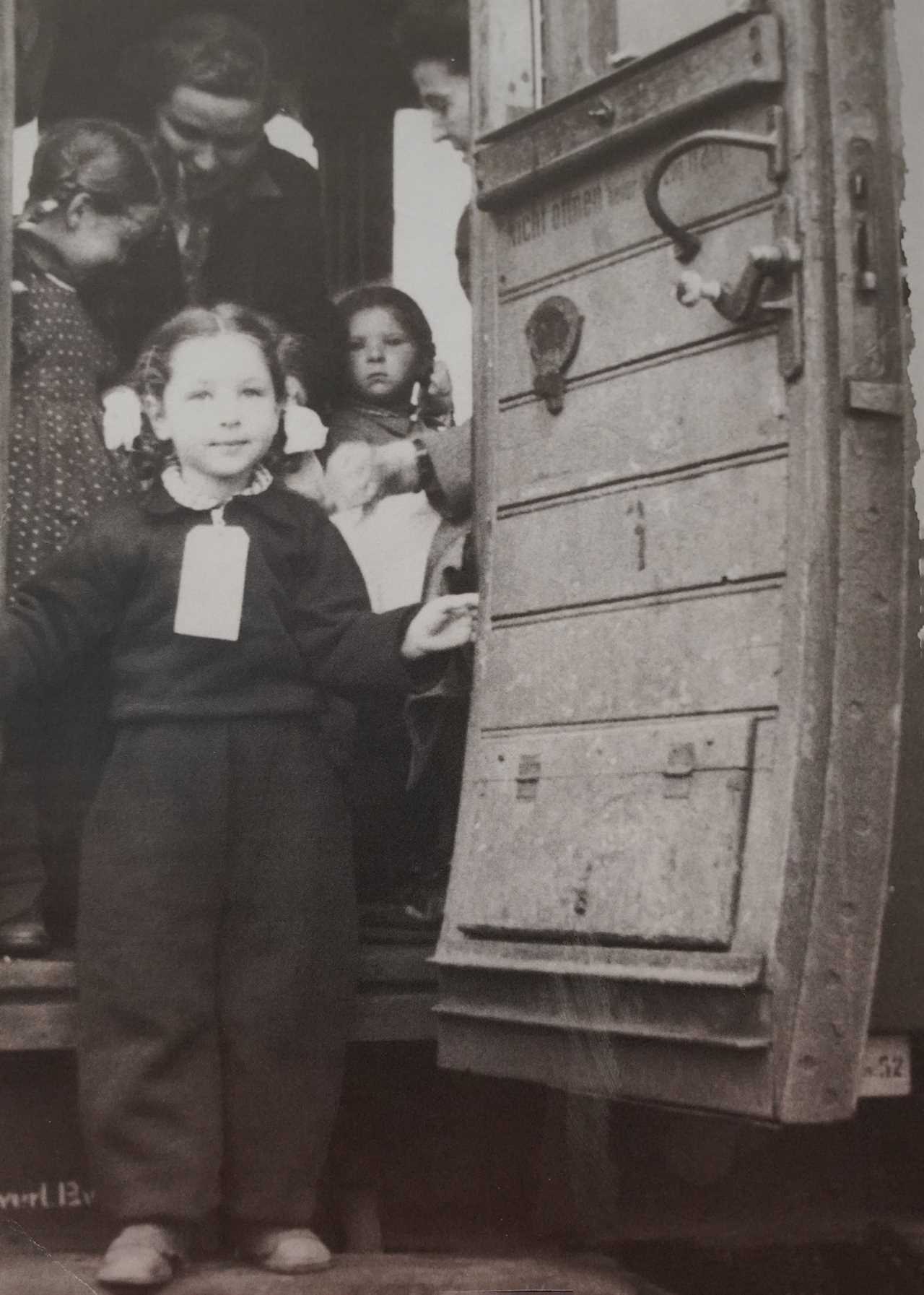
Abella boarding the train to Bremerhaven, the port where her family would take a boat to Canada (Courtesy of Rosalie Abella)
The majority opinion in Andrews was written by Bertha Wilson, the first woman on the Supreme Court. Brian Dickson was in the majority concurring. Abella sings the praises of Wilson and Dickson, authors of many influential early Charter decisions. “I call them the Fred and Ginger of the Charter. Because they choreographed it. And they did it wonderfully.” That would be Fred Astaire and Ginger Rogers. Abella often speaks in metaphors linked to Broadway and Hollywood musicals. Broadway has always been her escape, in person, in recordings, in memory or imagination.
Now, it’s easy enough for courts to extend rights to somebody like Mark David Andrews, who’d been to all the prestigious schools and whose only sin against the Canadian establishment was that he actually was British, instead of merely acting British. But Abella walked me through a set of cases in which the principles of Andrews were applied in situations where the exclusion was more pronounced and the prejudices more entrenched.
One was Rosenberg v. Canada, a pension benefits case from 1998. “It was about language on pensions in the Income Tax Act that said you could only leave a pension to an opposite-sex spouse,” she recalls. Abella wrote the decision for a unanimous three-judge panel of the Ontario Court of Appeal. “We wrote ‘or the same sex.’ We just wrote it in.”
Twenty-three years later this solution still sounds cheeky. But there it is in the Rosenberg ruling: “The appropriate remedy under s. 52 of the Constitution Act, 1982, is, in my view, to read the words ‘or the same sex’ into the definition of ‘spouse’ in s. 252(4) of the Income Tax Act.” The federal government was the defendant in the case. It decided not to appeal. Of such things are little revolutions born. By 2004, when Abella arrived at the Supreme Court, the first case she heard was a reference from the federal government on same-sex marriage. The Supremes gave same-sex marriage legalization a green light.
“There was something really quite wonderful about the confidence of the Canadian courts to do their job,” Abella says, “knowing that it will sometimes get them into popularity issues with the public.”
That’s putting it mildly. Abella has long been Exhibit A in the argument that the courts in general, and the Supreme Court in particular, are the vehicle for a wholesale rewrite of the plain text of Canadian law. As early as 1997, Andrew Coyne was writing that Abella was “once seriously mentioned” as a potential Supreme, his tone one of evident relief that those crazy days were past. When it turned out they weren’t—when Paul Martin put Abella and Louise Charron on the court in 2004—my friend Coyne wrote another column. He’ll be pleased to know Abella can quote parts of it to this day.
“Ms. Abella is so far out of the mainstream, even among liberal jurists, that her appointment can only be seen as a deliberate provocation,” Coyne wrote. Her place in or out of the mainstream was, and continues to be, debatable. She’s a member of the American Academy of Arts and Sciences, she’s the first Canadian woman to hold an honorary degree from Yale, she’ll be the first Canadian jurist with a chair at Harvard Law School this fall, and on and on. To some extent, a complaint about Abella should long since have ceased being about her location in relation to the mainstream. It should now be a complaint about the nature of the mainstream, if one feels like making that complaint.
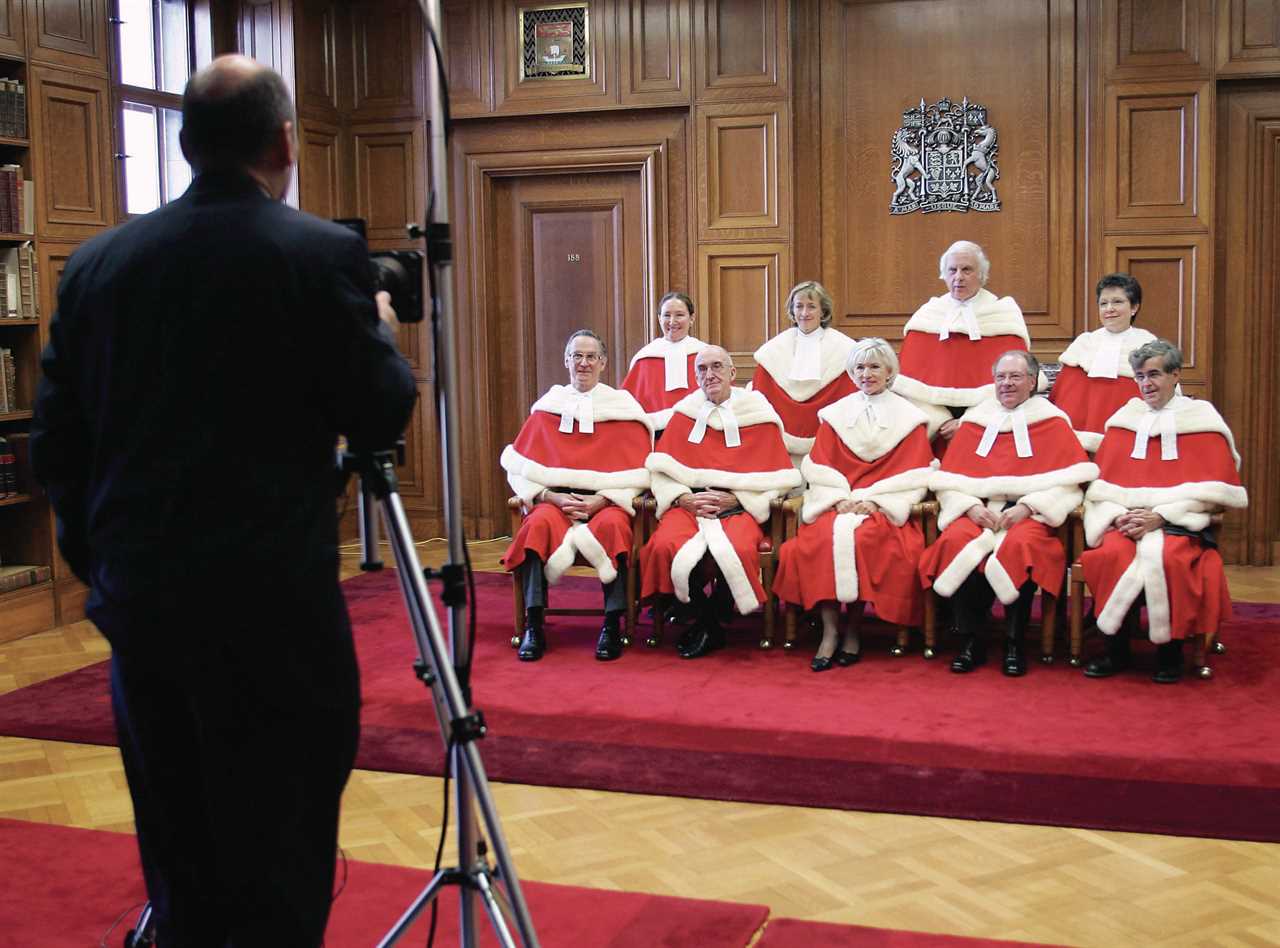
Posing for an official Supreme Court photo (Abella in back row, far left) in 2004 (Jonathan Hayward/CP)
But that Abella made the law up as she went along? Oh, yeah, that’s been a common argument. Abella has often seemed almost to invite it. In a 2018 speech in Jerusalem, she said, “A Supreme Court must be independent because it is the final adjudicator of which contested values in a society should triumph.” Well, there you have it: a judge deciding values, not the law. Constitutionalist Mark Mancini wrote: “Her comments should give us pause. She presents a vision of a Supreme Court that decides what Canadian values are, and then imposes them on the society generally. We should first call this for what it is: judicial supremacy, in which rights are not recognized as much as they are created out of whole cloth at the discretion of the Supreme Court.”
Abella has heard it before. If it bugs her she doesn’t show it. “When you’re a judge, there are no cases where you get a letter of thanks from the person who lost,” she says. “You will be seen to have gotten it wrong in 100 per cent of the cases, for 50 per cent of the litigants.”
Of the “politicians in robes” accusation, she says, “Those are just labels that are meant to presumptively diminish the perceived integrity of a decision. When you say, ‘That answer trespasses beyond your role’—who’s to say what my role is? Is there a tripwire I’m not seeing? An invisible line? This is the way constitutional courts interpret the constitution all over the world. And all over the world, there are people who say, ‘Who do you think you are?’ Because they have never accepted the concept that there is a relationship between legislatures and courts.”
What’s the relationship? “Legislators are people who go back to the polls every four years to see whether or not the people who voted for them still approve of what they’re doing. And if they do things that are storms of controversy, they risk losing their jobs. That’s democracy, right? You have an appeal to majoritarian concerns, which is how you get re-elected.
“Judges, on the other hand, are part of the democratic matrix”—because they’re appointed by political leaders, interpreting a constitution handed to them by legislatures—“and they don’t have to worry about whether or not they’re going to be re-elected in four years, and whether a decision they make is going to cost them their job. Maybe there will be a reputational hit, but you know, with tenure, you’ve got time to make up for it and you have to do the right thing. So we’re the people in the democratic universe who have the right to make those decisions that a legislator may not be comfortable making.”
Not that politicians don’t have guts, she hastens to add. “Look at the history of the legislation in the ’70s: official bilingualism, multiculturalism, Charter of Rights and Freedoms, constitutional conferences, family-law changes all across the country. They can do very brave things. But there clearly are some issues that they’re less comfortable doing. But we don’t have that anxiety hanging over us. We have time on our side. And history. Time will tell us whether it turned out to be the right decision or not for the public. And if it wasn’t, another court will change it. Or the government will change it.”
But to some extent, the critique of a sweeping, bold vision of the court’s role is now coming from inside the court. Advocates of a more conservative vision—not in the partisan sense, but in the sense of a self-effacing court that departs reluctantly from the plain text of law—have begun to form a more solid bloc on the court itself. Richard Wagner, the chief justice, has frequently found himself on the opposite end of a ruling from Abella. So has Russell Brown, one of Stephen Harper’s last court appointees, and Malcolm Rowe, one of Justin Trudeau’s first.
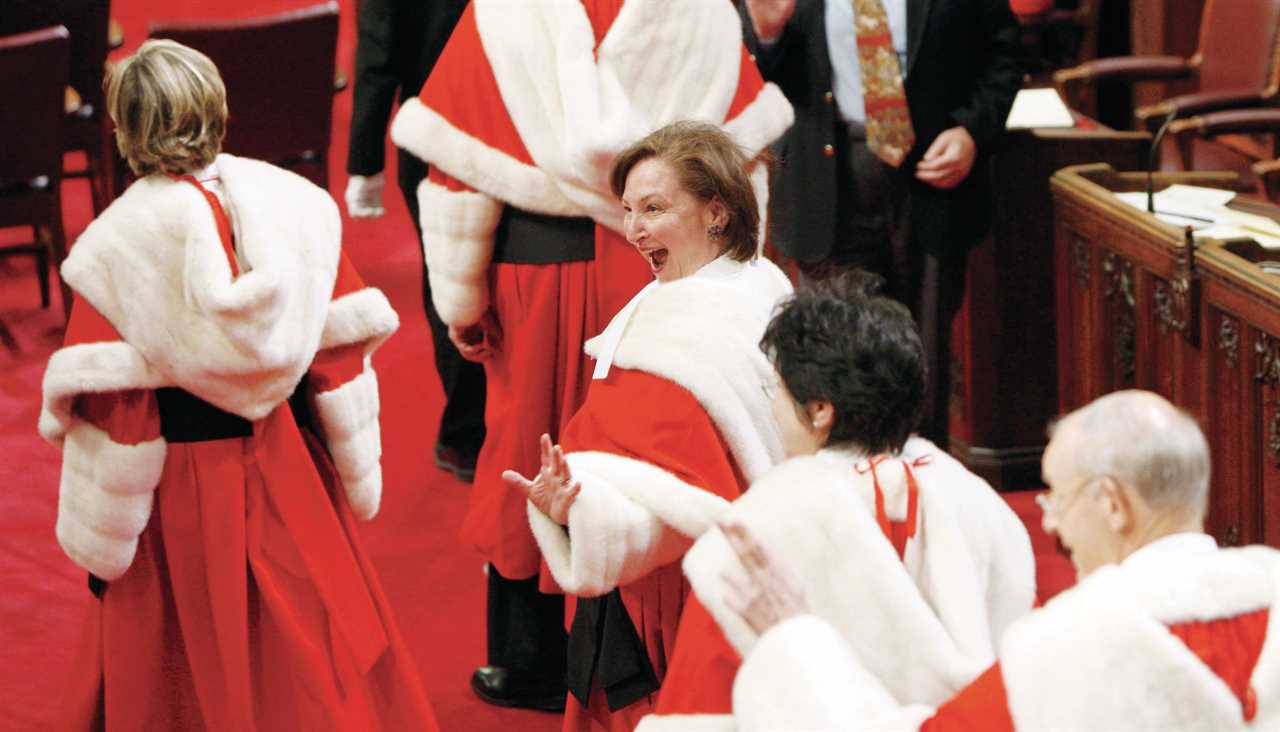
Abella in the Senate in 2010 (Chris Wattie/Reuters)
This makes the moment of Abella’s departure, and the choice of her successor, significant. The Wagner court hands down fewer unanimous decisions than it did when Beverley McLachlin was chief justice. She prized consensus, even at the expense of less sweeping decisions. Wagner is more at ease with division. On a divided court, every vote counts. Lately the court has felt like the last minutes of a basketball game, with the score nearly tied. The next move will decide the game, perhaps for decades to come.
Speaking slowly and choosing her words with care, Abella accepted the premise of my question. She essentially endorsed the notion that the court has reached a crucial turning point. “There’s no doubt that the court now has more people on it who genuinely—and every one of them has a genuine view of the role—sincerely believe that, unlike Brian Dickson, Bertha Wilson, unlike the approach of the court in the last, essentially 40 years, there is merit to reining in our approach to the Charter and giving more berth to Parliament. I’m perfectly comfortable with those 40 years and the judicial traditions that have gone before, because I think we will sometimes agree with the government, and sometimes not.
“But my philosophical framework is, rights are meant to be protected. And when the legislature gave us constitutionally protected rights, they were serious. And we had to be serious. And that meant, over and above the protection legislators give to people in rights, we’re the last stop in protecting interests that cannot be protected by the legislature, necessarily. And I think going forward, that debate will play out.”
For the first time in decades, it will be a debate in which Abella is only a spectator. A highly interested and opinionated spectator, but one whose energies are now reserved for her family and her students. “One of the reasons I never used to give interviews, because people were always intrigued—‘Oh my, how do you balance work and family?’—I said to them, ‘When I’m 75, come back. And if my kids are nice people, and if my husband still likes me, and if I’m able to look back and say there was integrity all along the way, it’s not anybody’s back I’ve stepped on to get here, then I’ll start giving interviews about how I did it.’ ”
This article appears in print in the July 2021 issue of Maclean’s magazine with the headline, “Rosie Abella said she’d answer questions when she turned 75.” Subscribe to the monthly print magazine here.
The post Rosie Abella said she’d answer questions when she turned 75 appeared first on Macleans.ca.
-------------------------------
By: Paul Wells
Title: Rosie Abella said she’d answer questions when she turned 75
Sourced From: www.macleans.ca/news/rosie-abella-said-shed-answer-questions-when-she-turned-75/
Published Date: Tue, 15 Jun 2021 19:53:22 +0000
Read More
 UK PoliticsWorld PoliticsVideosPrivacy PolicyTerms And Conditions
UK PoliticsWorld PoliticsVideosPrivacy PolicyTerms And Conditions
